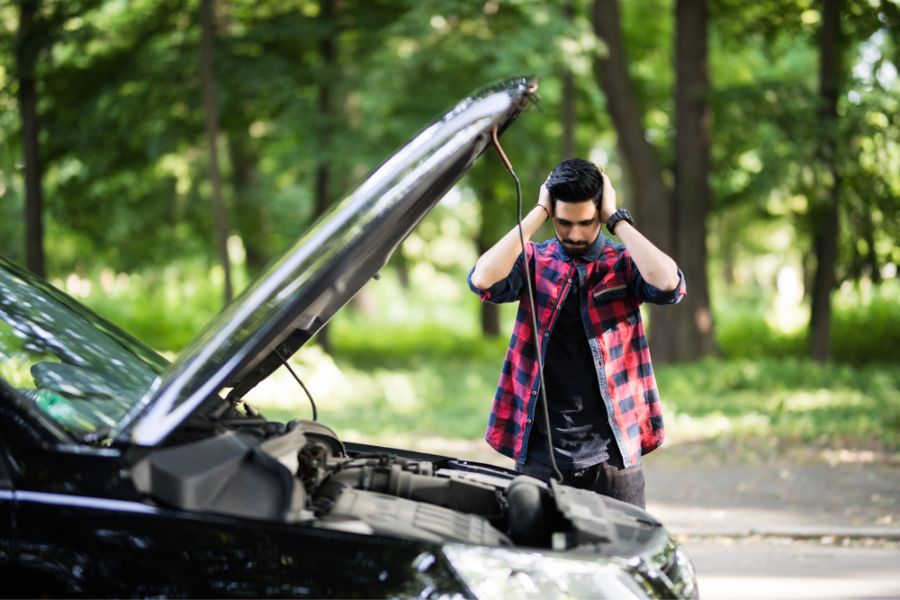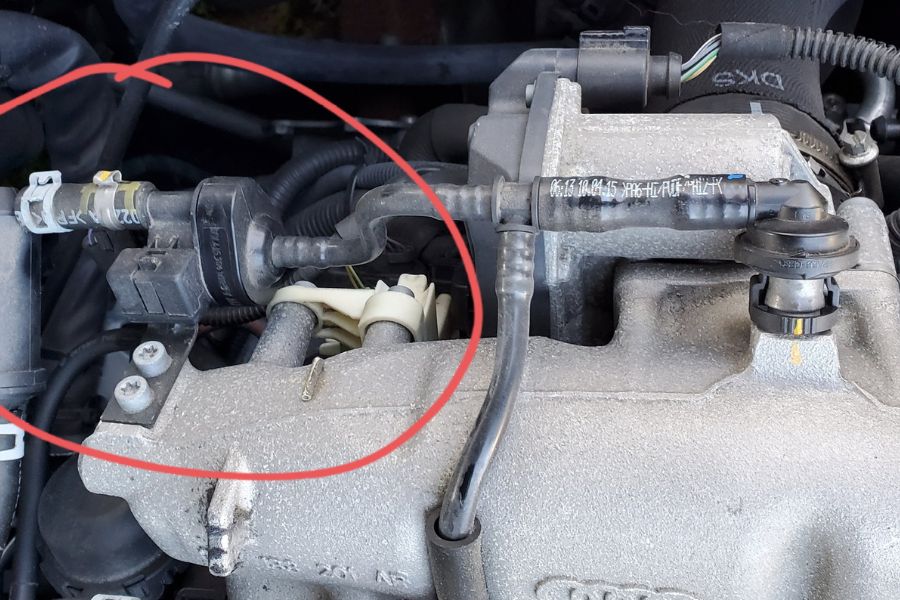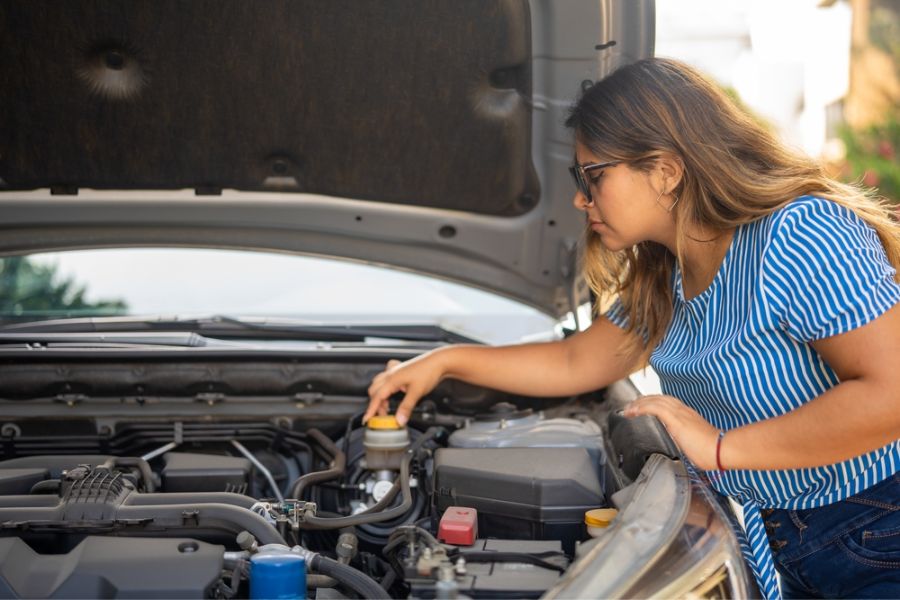You’ve just filled up your car with gas, and it won’t start. Frustrating, right? Well, you’re not alone. We’ve heard from lots of folks just like you, dealing with the same problem.
It’s important because it could be a sign of a bigger problem with the car, like overfilling the gas tank, which could cause the engine to flood or spilled fuel to get into the EVAP system.
Here’s what’s going on with your car after you fill it up with gasoline and how to fix it.
Why Your Car Won’t Start After Gas Fill-Up
So, your car won’t start after getting gas. This can be due to a few things. It could be a blockage in your fuel filter, a glitch in the purge valve, or even a mistake made while refueling. Sometimes, if you run your car completely out of gas, it can make starting up tricky after a fill-up.
You might notice this issue right after you fuel up at the gas station, or maybe after your car has been parked a while post-refuel. Keep an eye on when this happens – it might give us clues to help fix the problem.
Your car needs gas to run, right? It’s the juice that powers your engine. But if something goes wrong during refueling, it might stop your car from starting.
Your engine needs the right amount of gas at the right time. If something messes up this flow, it can prevent your car from starting. For example, if you overfill the tank, gas can flood your car’s vapor recovery system, messing with the purge valve. This can stop your car from starting up.
Ignoring this issue could end up harming your car’s engine or fuel system over time. That’s why we need to understand what’s going wrong and get it sorted out. After all, we all want our cars to start up smoothly, especially after a nice, full tank of gas!

Common Reasons Your Car Won’t Start After Getting Gas
We all know how annoying it can be when your car won’t start after you fill up the tank. Let’s take a closer look at what might be causing this and how you can tell if your car has these issues.
There are two big buckets of things that can cause this problem: car parts breaking down and mistakes made while filling up.
If a car part called a fuel filter gets blocked or a part called a purge valve doesn’t work right, your car might not start. Also, problems with the fuel pump or the engine control unit can cause this.
If you or someone else puts the wrong type of gas in your car, doesn’t close the gas cap right, or fills the tank too much, this can also cause your car to not start after getting gas.
How to Tell If Your Fuel Filter Is Blocked
If the fuel filter is blocked, it can stop gas from getting to the engine. This makes it hard for your car to start.
You might have a blocked fuel filter if your car uses more gas than it used to, the engine doesn’t run smoothly, or you have trouble starting your car. If you notice these things, it might be a good idea to get a new fuel filter.
How a Broken Purge Valve Can Cause Problems
The purge valve helps control how fuel vapors move from one part of your car to another. If it’s broken, too many vapors might end up in the engine, and this can make it hard to start your car after filling up.
If you have trouble starting your car after getting gas, your car doesn’t idle smoothly, or the check engine light is on, your purge valve might be broken. If this is the case, you should get it fixed before it causes more problems.

Other Signs That Something Is Wrong
There are other things you might notice if your car won’t start after getting gas. You might see gas leaking, your car might use more gas than it used to, or the engine might not run smoothly.
If you notice these things, it’s important to figure out what’s wrong and fix it. This can help you avoid more problems down the road. And remember, if you’re not sure what to do, you can always ask a professional for help.
What Happens When You Run Out of Gas
Picture this: You’re driving and suddenly, your car sputters to a stop. You’ve run out of gas, and now you’re stuck. But that’s not all. Running out of gas can hurt your car, too. Let’s talk about why.
What happens when a car runs out of gas?
When your car’s gas tank hits empty, the engine stops working. It’s like trying to drink from an empty water bottle. Nothing comes out. And when the engine stops, that’s when the problems start. You lose control of your car and can’t steer or brake as well. It’s scary and dangerous.
But there’s more. Running out of gas can mess up your car’s fuel pump, too. Think of the fuel pump as your car’s heart. Just like your heart pumps blood around your body, the fuel pump sends gas to your car’s engine. But if there’s no gas, the pump can break down. And fixing it can cost a lot of money.
What will happen if you drive a car with an empty tank?
Driving on an empty tank is like playing a dangerous game with your car. Your gas tank can collect dirt and gunk at the bottom. If you drive when the tank is almost empty, this dirt can get sucked up into the engine. This can block the fuel filter, like a big lump of food blocking a straw.
If this keeps happening, it can ruin your car’s fuel system and engine. This damage can cost a lot to fix, and it can make your car break down more often.
The connection between running out of gas and the car not starting after refueling
Running out of gas and not being able to start your car after you fill up are connected. When your car runs out of gas, it uses every last drop in the tank. But if there’s dirt or bad fuel at the bottom, this can block the fuel filter. This can stop your car from starting after you’ve filled up.
Also, if the fuel pump gets damaged from running on an empty tank, it might not send fuel to the engine properly. This can also stop your car from starting. So, to keep your car running smoothly, try to keep your tank at least half full at all times.
What to Do When You Run Out of Gas
Running out of gas is no fun. Here’s what you need to do:
-
Stay Safe: Pull your car to the side of the road.
-
Call for Help: If you have roadside help, give them a ring. They’ll bring you gas.
-
Walk to a Gas Station: If there’s a gas station close by, grab a gas can and fill it up. Remember to be safe when handling gas.
And for emergencies, consider using a fuel cleaner to clear out the gunk in your fuel lines or pushing your car to a safer spot.
How to Get Your Car Running Again After Running Out of Gas
So, you’ve run out of gas and your car won’t start. Here’s what you can do:
-
Add More Gas: This seems obvious, but sometimes your car needs more than just a little gas to get going again.
-
Check the Fuel Line: If air gets in the fuel line, your car might not start. You might need to bleed the line to get the air out.
-
Get a Pro: If you’re still stuck, call a mechanic. They’ll know what to do.
Keep Your Car from Running Out of Gas
To avoid this whole mess in the future, try these tips:
-
Watch the Fuel Gauge: Keep an eye on your gas gauge. Try to fill up when it gets to a 1/4 tank.
-
Plan Ahead: If you’re taking a road trip, figure out where the gas stations are along your route.
-
Check Your Car: Regular check-ups can catch problems before they start. It’s like going to the doctor, but for your car.
By following these steps, you can avoid the headache of your car not starting after pumping gas.
Best Practices for Refueling a Car
There’s a right and a wrong way to fill up your car. Here are some simple rules to follow:
-
Turn off your engine when you’re pumping gas.
-
Don’t try to squeeze in more gas after the pump shuts off.
-
Make sure your gas cap is on tight when you’re done.
-
Use the type of gas that your car’s maker says to use.
-
Try not to fill up when a big truck is delivering gas to the station.
If you stick to these rules, you can avoid problems that might stop your car from starting. Too much gas can mess up your car’s system that collects vapors. Not having your gas cap on tight can make your check engine light come on. And using the wrong kind of gas can hurt your engine.

Maintenance Tips to Prevent the Car from Not Starting After Refueling
Just like you need a check-up every now and then, so does your car. Here are some tips to keep your car running smoothly:
-
Change your fuel filter when your car’s maker says to.
-
Check your purge valve and replace it if you need to.
-
Keep your fuel injectors clean with a special cleaner.
-
Make sure your car’s battery is still good, and get a new one if it’s not.
Doing these things helps your car’s fuel system work the way it’s supposed to. For example, a clean fuel filter keeps your engine happy, and a working purge valve helps your car start up smoothly.
It’s really important to take your car for regular check-ups. This helps you spot problems before they turn into something big. If your car is hard to start, uses more gas than usual, or if the check engine light comes on, take your car to a mechanic. It’s always better to fix a small problem before it turns into a big one.
So there you have it. With these simple steps, you can keep your car running smoothly every time you fill up. Safe travels!
Conclusion
Running out of gas is a big deal; it can mess up your ride and make starting a chore. These two issues often go hand in hand. If you run dry, don’t fret; we’ve got tips to help restart your engine and prevent future mishaps.
Plus, we’ve shared fueling tips and maintenance insights to keep your car purring. Regular check-ups and catching warning signs early can head off bigger problems.
Remember, taking care of your car can prevent many of these headaches!
